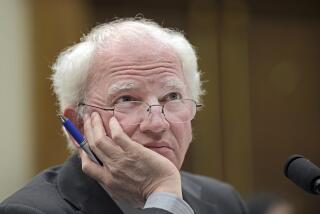Kozinski disciplines himself
In its editorial, “Free country,” The Times asks, “so what?” about Judge Alex Kozinski’s collecting of pornographic material while presiding over an obscenity trial. Well, here’s what: Kozinski, who recused himself from the case and declared a mistrial, has been arguing for years for tighter restrictions on federal judges.
A Times story reported that Kozinski maintained a private website replete with pornographic material, including “a picture of naked women on all fours painted to look like cows and a video of a half-dressed man cavorting with a sexually aroused farm animal.” Other images on the site depicted people masturbating and having sex in public. That the jurist in question is Kozinski, the chief judge of the U.S. 9th Circuit Court of Appeals and one of the most well-known and well-respected jurists in the nation, made the news all the more incendiary. Within 24 hours of the story’s publication, several hundred people had posted comments, many expressing disgust and calling for Kozinski’s impeachment.
Impeachment is the only way that a federal judge may be removed from office. It is a highly cumbersome process that requires a two-thirds majority of the U.S. Senate to conclude that a judge engaged in “high crimes and misdemeanors.”
There is little chance that Kozinski’s conduct, however distasteful, meets that standard. But that does not necessarily let him off the hook. Kozinski can still be disciplined under the Judicial Conduct and Disability Act of 1980, which was enacted by Congress “to fill the void which currently exists in the law between impeachable offenses and doing nothing at all.” Indeed, in a statement released on June 12, Kozinski took the unprecedented step of calling upon his colleagues to initiate proceedings against him under this statute. They’re taking him up on his offer, as they should.
The act requires that a special council of judges investigate credible complaints that accuse their brethren of having engaged in “conduct prejudicial to the expeditious administration of the business of the courts.” Anyone -- an ordinary citizen, an elected official, even a fellow judge -- can file such a complaint. While the misconduct standard is somewhat vague, Congress has made clear that it was intended to punish judges for “conduct prejudicial to the administration of justice that brings the judicial office into disrepute.” Rules enacted (pdf) by the judiciary in March 2008 have refined the definition to include behavior off the bench that results in “a substantial and widespread lowering of public confidence in the courts among reasonable people.” The outraged response of hundreds of Times readers, whose dismay extended from Kozinski’s conduct to include concern about the integrity of judges in general, is compelling evidence that this standard has been met.
Kozinski could also be disciplined for violating Canon 1 of the Code of Conduct for Federal Judges, which states that a “judge should participate in establishing, maintaining and enforcing high standards of conduct, and should personally observe those standards, so that the integrity and independence of the judiciary may be preserved.” Kozinski’s decision to maintain a pornographic website can be called a lot of things, but promoting “high standards of conduct” isn’t one of them. To be sure, the Canons are considered “aspirational” and not binding, so violating one or more of them will not necessarily subject a judge to sanctions. But it is certainly one important factor in the disciplinary calculus.
While a finding of judicial misconduct would not result in Kozinski’s permanent removal from the bench, the consequences could be quite severe nonetheless. The judicial council could bar Kozinski from hearing cases for months or even years, issue a public rebuke, recommend that he take early retirement or forward the facts uncovered in the investigation to a national committee of judges for other “appropriate action.”
The judiciary has come under fire in recent years for failing to use the act as intended. Critics accuse federal judges of going easy on their colleagues who committed egregious misdeeds out of a sense of sympathy or undue favoritism. Ironically, one of the most vocal was Kozinski himself. In 2005, he wrote a blistering dissent in which he castigated his colleagues for dismissing a misconduct complaint against District Judge Manuel Real.
Kozinski’s dissent made waves, attracting the attention of reporters, politicians and experts in judicial ethics. By exposing the glaring legal errors that riddled the majority’s opinion, and by highlighting the uncontested facts establishing Real’s improper conduct, Kozinski made a strong argument -- using blunt and highly quotable language -- that the council majority’s failure to find misconduct or impose punishment amounted to an abandonment of its disciplinary responsibilities.
And Kozinski went further, arguing that the majority’s opinion was not a misreading of the statute but a misalignment of priorities: His colleagues were concerned primarily with sparing Real’s feelings and reputation rather than enforcing the rules. He pointed out that the public is legitimately skeptical and the judicial system is consequently harmed when behavior that is clearly wrong is treated so lightly. “It does not inspire confidence in the federal judiciary,” he wrote, “when we treat our own so much better than we treat everyone else.”
Eventually, and in no small part because of the power of Kozinski’s written word, the circuit reopened the case and publicly reprimanded Real for two types of misconduct: making legal decisions based on an ex parte communication with a woman whose probation he was supervising “to the substantial detriment of the opposing parties in the litigation,” and giving “inaccurate and misleading” testimony in an attempt to justify his actions to the judicial council.
Kozinski’s assessment found traction beyond the Real case. In 2006, a commission of judges appointed by the late Supreme Court Justice William Rehnquist found that judges mishandled high-profile misconduct cases -- including Real’s -- nearly 30% of the time, an error rate the committee admitted was far too high. Subsequent reforms proposed by the committee, and designed to tighten disciplinary standards, were adopted by the judiciary in March of this year.
How ironic, then, if the very rigor that Kozinski argued for with such eloquence is used to serve his own comeuppance. The argument for tougher standards on judges, it seems, has come full circle.
Lara A. Bazelon is a deputy federal public defender on a temporary leave. She is writing a law review article about judicial misconduct.
Blowback is an online forum for full-length responses to our articles, editorials and Op-Ed articles. Click here to read more about Blowback, or submit your own by e-mailing us at opinionla@latimes.com.
More to Read
A cure for the common opinion
Get thought-provoking perspectives with our weekly newsletter.
You may occasionally receive promotional content from the Los Angeles Times.






